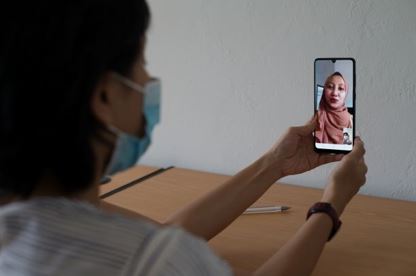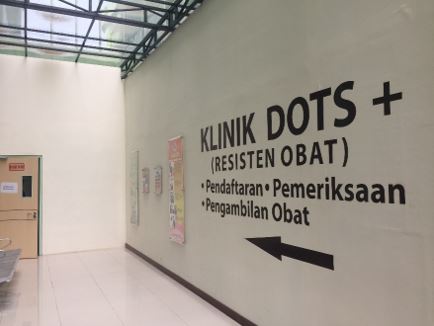“From tele-counselling to community-based care: how the TB programme adapted during the pandemic”

Caption: Illustration of TB counselling via video call that helps patients to stay on treatment while unable to attend face to face consultation during the pandemic.
Photo credit: WHO Indonesia
It is only 7 in the morning, and Siti Rofiqah, a tuberculosis (TB) counsellor, is already sitting at her desk at home in Jakarta, ready for her first consultation. This morning, she has a video call appointment with a drug-resistant TB (DR-TB) patient who is in her second month of treatment.
“Most of the questions I get from DR-TB patients are around the side effects of TB medicines. Patients want to know whether it is normal to feel nauseous or to lose appetite while on treatment,” said Rofiqah. “During the pandemic, some TB patients are also asking what extra precautions they should be taking to protect them from getting infected with COVID‑19.”
Through the video call, Rofiqah explained that it is common to experience nausea and dizziness during DR-TB treatment and can be managed with adequate nutrition and exercise. She further advised patients to wear a mask and maintain physical distancing to avoid passing on TB to others and at the same time, protect themselves from contracting COVID‑19.
Before the COVID‑19 pandemic, Rofiqah and other TB patient supporters (PS) attended to patient consultations at community health centres (Puskesmas). Since 7 April 2020, large scale social restriction started to be implemented in Jakarta for several months to reduce the transmission of COVID‑19. Consequently, DR-TB patients are reducing their visits to health facilities. Indonesia observed a decline in TB case notification by 68% in the first three months of 2020. TB counselling and care programmes quickly shifted to video call format or tele-counselling.
Indonesian TB Patient Organization (POP TB) launched a survey to better understand patients’ and counsellors’ needs during the pandemic. The survey results showed that many DR-TB patients, especially patients from low-income families, do not own smartphones to attend tele-counselling. POP TB together with STOP TB Partnership raised funds to provide 200 smartphones for patients and counsellors in DKI Jakarta, West Java, and East Java.
"We want to try new and effective ways to end TB in Indonesia. The COVID-19 pandemic has not stopped our work, instead we are motivated to increase home-visits and encourage patients to attend tele-counselling services through video call, "said Budi Hermawan, Chairman of POP TB Indonesia.
Patients and counsellors were trained to use EMPATI and OneImpact mobile applications. EMPATI is a monitoring and recording information system developed by KNCV Tuberculosis Foundation (KNCV) to ensure TB patients complete their treatment. OneImpact is a mobile application initiated by the STOP TB Partnership and adapted by Nadhlatul Ulama Healthcare Institution (LKNU) to empower patients and communities by providing comprehensive information about TB and encouraging communities to connect and share experiences.
Through these two applications, a patient supporter like Rofiqah can monitor patients’ medication adherence. Patients are also able to chat and post questions at any time to PS and the TB patient network.
The efforts of POP TB and STOP TB partnerships are showing positive results. Despite the pandemic, the TB patient drop-out rate in East Jakarta has decreased from 23% in 2019 to 8% in 2020. According to Budi, this could be attributed to more intensive online communication between patients and counsellors during the pandemic as well as heightened awareness that people who are ill with both TB and COVID‑19 may have poorer treatment outcomes, especially if the TB treatment is interrupted.

Caption: Drug-resistant TB clinic in Pasar Minggu Hospital, South Jakarta. During the pandemic, TB treatment and care in South Jakarta prioritised people-centred outpatient and community-based care over hospital treatment to reduce opportunities for COVID‑19 transmission.
Credit: Yoana Anandita/WHO Indonesia
The South Jakarta District Office has observed similar challenges during the pandemic. The number of TB patients visiting the clinic for drug-resistant TB treatment has dropped from around 600-1 000 patients per month to around 500 patients.
"We adapted our work to bring services closer to patients, for example, by assigning our community health centre staff to deliver medicines to patients. Health facilities also ensure patients have sufficient medicines for up to one month,” said Dr Ika Dewi Subandiah, person in charge for TB Programme, South Jakarta District Health Office.
In line with WHO recommendations, TB treatment and care in South Jakarta Health District Office prioritised people-centred outpatient and community-based care over hospital treatment to reduce opportunities for COVID‑19 transmission.
The role of community case workers and counsellors became more important during the pandemic. Chat groups served as a one-stop centre to for TB education, counselling, and care. TB counsellors regularly remind patients to take medication, report their health condition, and maintain a healthy diet.
"Community TB workers and digital technology are key in reaching out to patients during the pandemic. TB education is more effective when delivered by community counsellors, because they are the ones who are more familiar to the patients. Chat-based communications are less formal, so patients are not reluctant to raise any questions or concerns,” said Dr Ika.
A recent programme evaluation conducted by the South Jakarta TB Programme shows that these initiatives have managed to keep the patient drop-out at the pre-pandemic level.
These examples from POP TB and the South Jakarta TB Programme show that the use of digital technology and the role of community TB workers and counsellors contribute significantly to patient treatment adherence. Beyond the pandemic, these adaptations can be further developed to reach TB patients in hard-to-reach areas in Indonesia.
